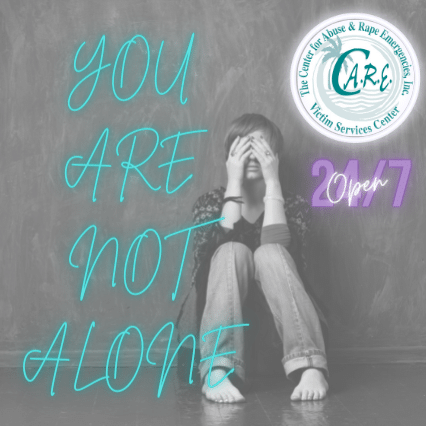If you are suspecting that your friend or family member is experiencing abuse of any kind, there are things YOU CAN do to help.
Guide them to Community Services
Let your friend know about the services offered in your community, like us at C.A.R.E. Let your friend know that THEY ARE NOT ALONE and that if he/she doesn’t want to discuss the abuse with you, they can contact a certified victim advocate for FREE and everything they say is completely confidential.
Hotline: 941-624-6000
Helpline: 941-637-0404
Englewood, FL: 941-475-6465
Text: 941-499-8534


DOMESTIC VIOLENCE
Start the Conversation
You can bring up the subject of domestic violence by saying:
“I’m worried about you because …..” or “I’m concerned about your safety…”
Maybe you’ve seen the person wearing unusual clothing for the weather to cover up bruises or noticed that the person wearing extra make-up. Maybe they have suddenly become unusually quiet or withdrawn. All of these behaviors can be signs of abuse.
Listen Without Judgment
If the person does decide to talk, listen to the story without being judgmental. This can be difficult at times for many of us, just do your best. Offer advice, or suggest realistic solutions. Let the person vent their feelings and fears. You may be the first person in which the victim has confided.
Believe the Victim
Domestic violence is more about control than anger, often the victim is the only one who sees the dark side of the perpetrator. More often than not, friends and family members are shocked to learn that a loved one could commit acts of violence. Consequently, victims often will feel that no one will believe them if they told people about the violence.
Examples include:
- I believe you
- This is not your fault
- You don’t deserve this.
Validate their Feelings
It’s not unusual for victims to express conflicting feelings about their partner and their situation.
These feelings can range from:
- Guilt/ Anger
- Hope/ Despair
- Love/ Fear
It is important you validate their feelings by explaining that, having these conflicting thoughts/feelings is completely normal. But it is also important that you confirm that violence is not okay! It is not normal to live in fear of being abused.
Build your friend up
Let them know their potential, they will survive and overcome this situation. Describe all of their good qualities; “You are: Strong, Beautiful, Intelligent, ETC .
Be patient
Reaching out for help takes A LOT of courage. There are many factors that may delay your friend from seeking help or leaving their abuser.
Here are just a few examples:
- Fear of harm if they leave
- Thinking the abuse is their fault
- Staying for the children
- Lack of means (job, money, transportation) to survive on their own
There is also a good chance if they leave their abuser, they may go back. Please remember to be patient and supportive despite how frustrating the situation may become. Your friend/ family member needs you!
SEXUAL ASSAULT
Believe the Victim
Make it clear to the victim you believe the assault happened and that the assault is the fault of the abuser, NOT the victim.
Remain calm
You might feel shock, anger or rage, but expressing these emotions to the victims may cause more trauma.
Encourage medical attention
Medical care is important, there may be internal injuries that are not obvious, or the victim may have been exposed to sexually transmitted diseases. Victims are entitled to a forensic medical exam, whether or not they decide to report the assault to Law Enforcement.
Give the Victim Control
Control has been stripped from the victim during the assault. Allow the victim to make their own decisions about what steps to take next, while staying supportive.
Maintain confidentiality
Let the victim decide who will know about the assault.
Let the victim express feeling
Listen without adding your opinions. If the victim wishes to remain silent, do not force discussion. Say you will be there to listen always. It is important for you not to judge a victim’s response. One victim may react very emotionally and another may be extremely calm. No matter how victims react, their emotions are normal and okay.
Some common/immediate reactions to sexual assault:
- Crying/sobbing
- Shaking/ denial
- Fear/shame/anger
- Self-blame/guilt/helplessness
- Embarrassment
